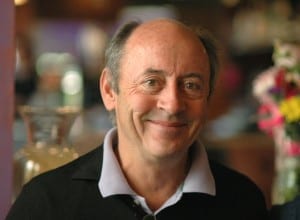Interview with Billy Collins
The below is an excerpt of Andrew Kuhn’s interview of Billy Collins. Full interview text is available in the book How a Poem Can Happen, or upon special request.
Billy Collins read for the Katonah Poetry Series on April 27, 2014.
 Andy Kuhn: You have been involved with the Katonah Poetry Series for a long time, happily for all of us. Can you say a little about how that came about, and how the Series and your engagement with it have changed over the years?
Andy Kuhn: You have been involved with the Katonah Poetry Series for a long time, happily for all of us. Can you say a little about how that came about, and how the Series and your engagement with it have changed over the years?
Billy Collins: My then wife and I moved into an old mid-19th century house in northern Westchester in 1989. We had been living in Scarsdale, and like many people in that part of the county, we never ventured to the north. So the scene was very new to us. Then one day I found in a local paper that William Matthews was going to be reading at the Katonah library the following Sunday. That’s how I discovered the series, then run by its founder Robert Phillips. I was amazed that some of the top poets in the country would be coming to my local library. When Phillips accepted a job offer from the University of Houston, he left a career in advertising and asked me if I would take over as director. A natural born shirker of official responsibilities, I hesitated. But in the end I promised to bring the series into its 25th year—in two years time—but I ended up at the helm for I think 15 years. Now the reins are in the capable hands of others who are kind enough to consult me on their choice of poets.
AK: You have spoken of your poetic persona or avatar as that of the flaneur, which is an evocative French term. My friends at Wikipiedia tell us this about the flaneur:
“Flâneur (from the French noun flâneur), means “stroller”, “lounger”, “saunterer”, or “loafer”. Flânerie refers to the act of strolling, with all of its accompanying associations. The flâneur was, first of all, a literary type from 19th century France, essential to any picture of the streets of Paris. It carried a set of rich associations: the man of leisure, the idler, the urban explorer, the connoisseur of the street.”
Were you a flaneur before you ever heard of the term, or were you won over to this stance after having read about it? Do you have any literary heroes who were or are flaneurs?
BC: Before my acquaintance with flaneuring (not a word, by the way) I was attracted to that figure in English Romantic poetry who wanders through the countryside—unlike the urban flaneur—often falling into a reverie then writing a poem that is a mix of landscape and thought. He’s a stroller, a dawdler, head in the clouds. My persona is really a modernized version of that character drawn primarily from Wordsworth and Coleridge. He is by nature a day dreamer whose favorite toys are his thoughts. Not content to leave the natural world alone, he uses its scenes as launching pads for imaginative flights. By the way, the flaneur tradition was recently revived in a terrific book by Teju Cole titled Open City.
